Unit 2 Saving the earth语法综合精讲精练 仁爱版英语九年级上册
文档属性
| 名称 | Unit 2 Saving the earth语法综合精讲精练 仁爱版英语九年级上册 | 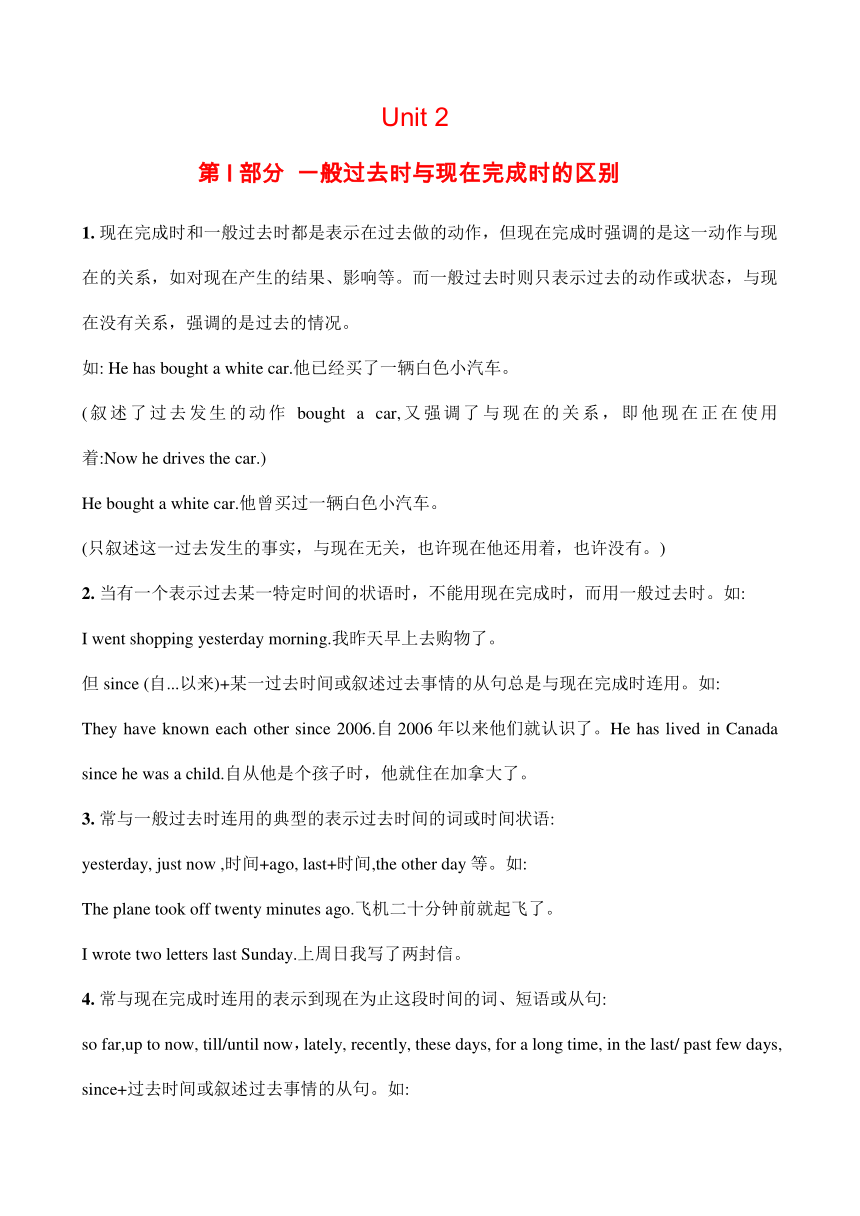 | |
| 格式 | docx | ||
| 文件大小 | 187.5KB | ||
| 资源类型 | 教案 | ||
| 版本资源 | 仁爱科普版 | ||
| 科目 | 英语 | ||
| 更新时间 | 2024-02-07 17:02:42 | ||
图片预览

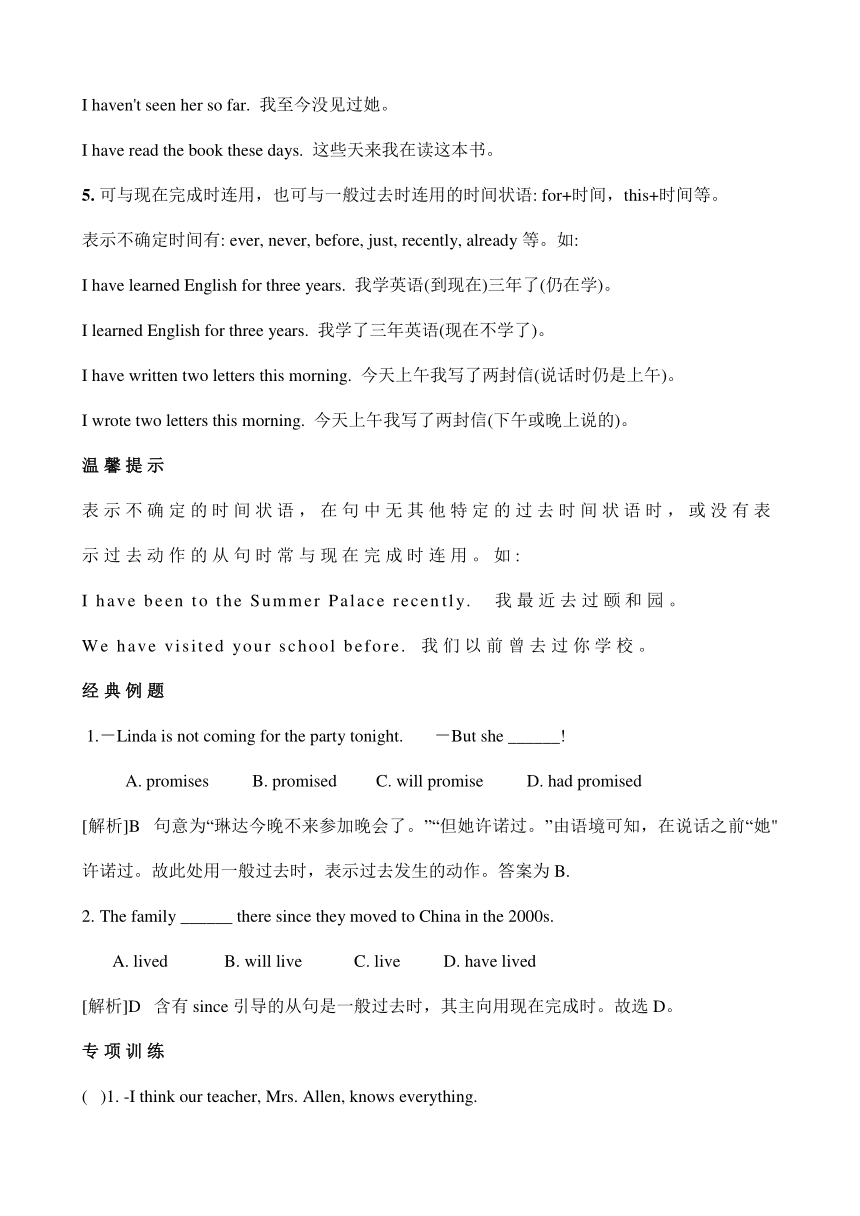
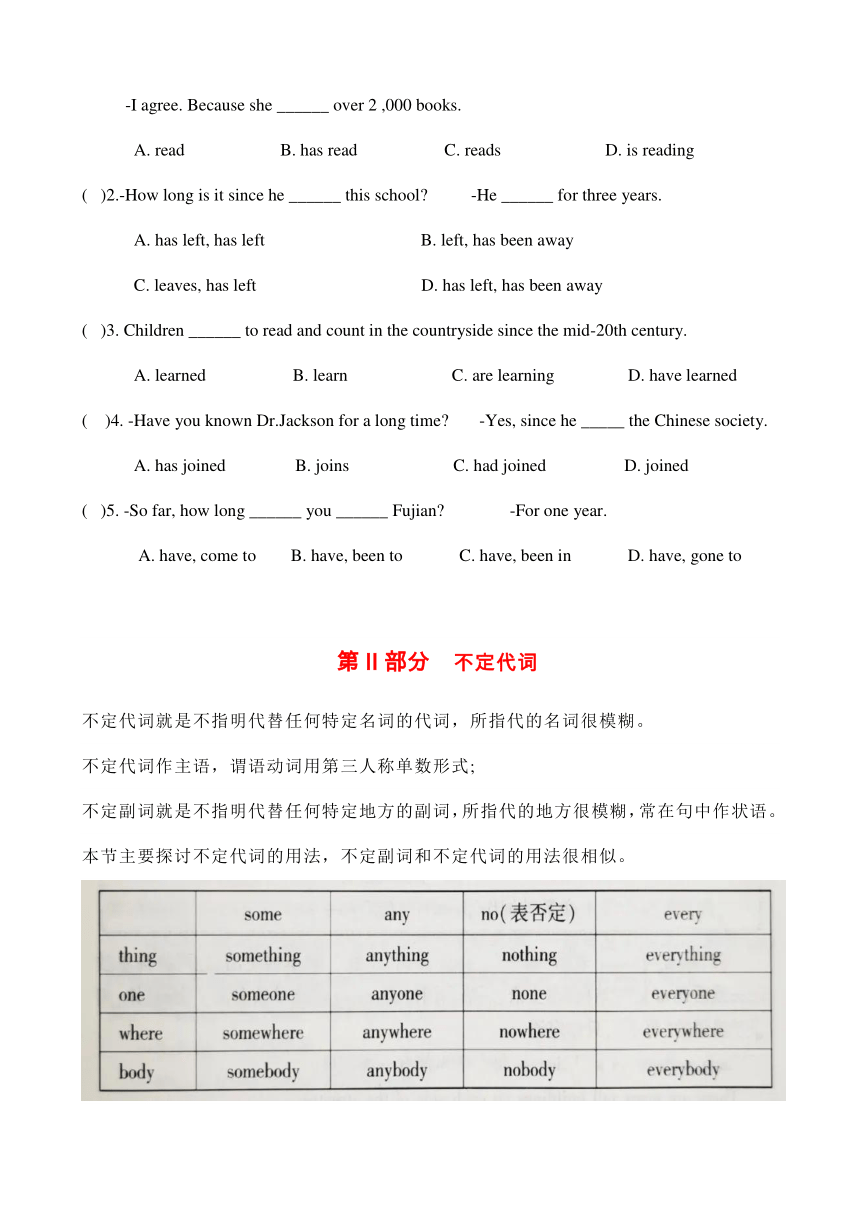
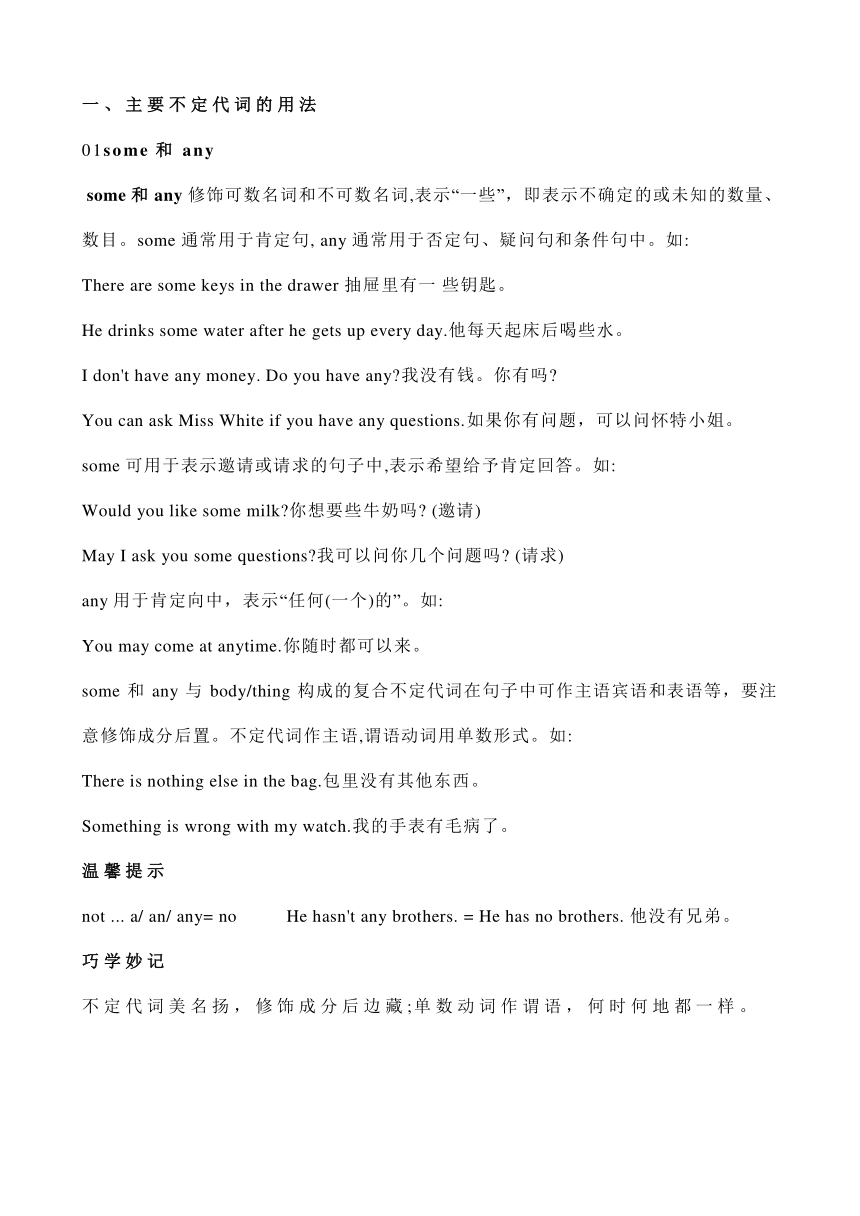
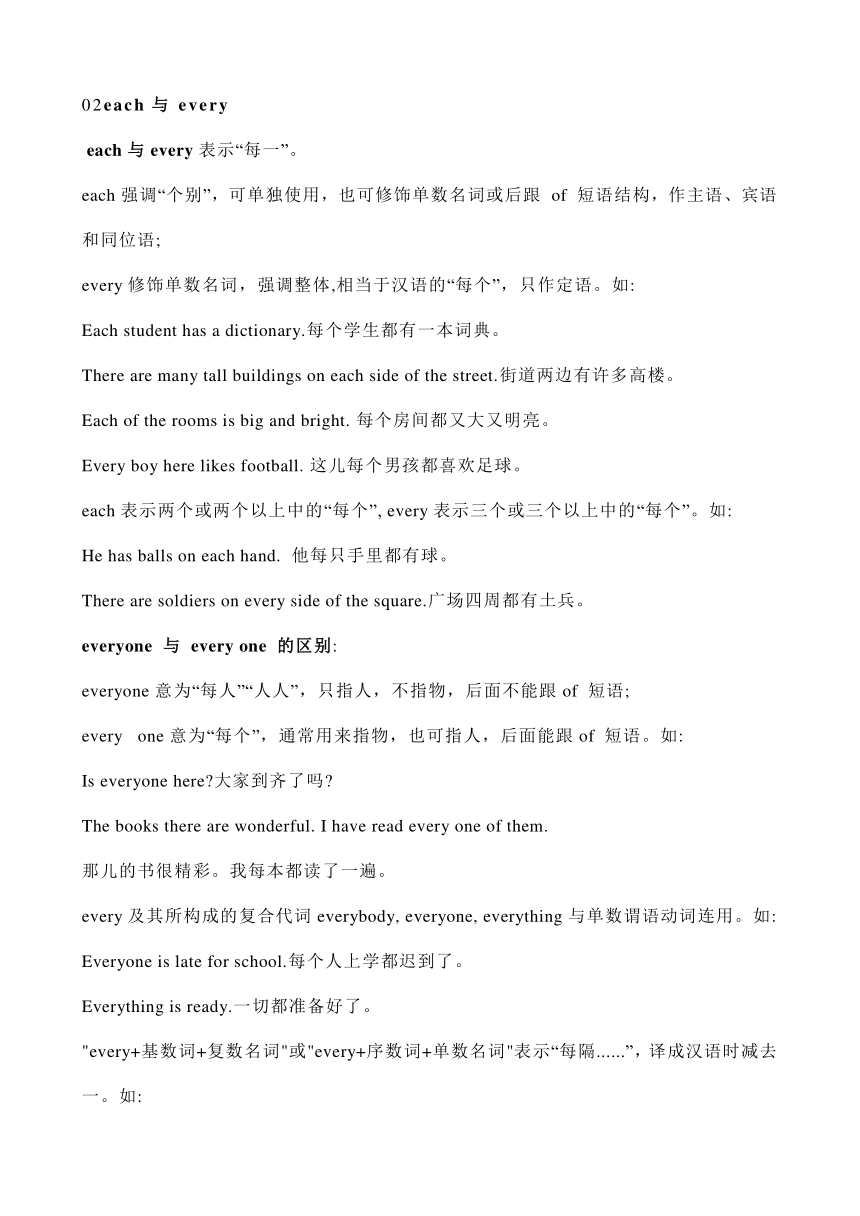
文档简介
Unit 2
第I部分 一般过去时与现在完成时的区别
1. 现在完成时和一般过去时都是表示在过去做的动作,但现在完成时强调的是这一动作与现在的关系,如对现在产生的结果、影响等。而一般过去时则只表示过去的动作或状态,与现在没有关系,强调的是过去的情况。
如: He has bought a white car.他已经买了一辆白色小汽车。
(叙述了过去发生的动作bought a car,又强调了与现在的关系,即他现在正在使用着:Now he drives the car.)
He bought a white car.他曾买过一辆白色小汽车。
(只叙述这一过去发生的事实,与现在无关,也许现在他还用着,也许没有。)
2. 当有一个表示过去某一特定时间的状语时,不能用现在完成时,而用一般过去时。如:
I went shopping yesterday morning.我昨天早上去购物了。
但since (自...以来)+某一过去时间或叙述过去事情的从句总是与现在完成时连用。如:
They have known each other since 2006.自2006年以来他们就认识了。He has lived in Canada since he was a child.自从他是个孩子时,他就住在加拿大了。
3. 常与一般过去时连用的典型的表示过去时间的词或时间状语:
yesterday, just now ,时间+ago, last+时间,the other day等。如:
The plane took off twenty minutes ago.飞机二十分钟前就起飞了。
I wrote two letters last Sunday.上周日我写了两封信。
4. 常与现在完成时连用的表示到现在为止这段时间的词、短语或从句:
so far,up to now, till/until now,lately, recently, these days, for a long time, in the last/ past few days, since+过去时间或叙述过去事情的从句。如:
I haven't seen her so far. 我至今没见过她。
I have read the book these days. 这些天来我在读这本书。
5. 可与现在完成时连用,也可与一般过去时连用的时间状语: for+时间,this+时间等。
表示不确定时间有: ever, never, before, just, recently, already等。如:
I have learned English for three years. 我学英语(到现在)三年了(仍在学)。
I learned English for three years. 我学了三年英语(现在不学了)。
I have written two letters this morning. 今天上午我写了两封信(说话时仍是上午)。
I wrote two letters this morning. 今天上午我写了两封信(下午或晚上说的)。
温馨提示
表示不确定的时间状语,在句中无其他特定的过去时间状语时,或没有表示过去动作的从句时常与现在完成时连用。如:
I have been to the Summer Palace recently. 我最近去过颐和园。
We have visited your school before. 我们以前曾去过你学校。
经典例题
1.-Linda is not coming for the party tonight. -But she ______!
A. promises B. promised C. will promise D. had promised
[解析]B 句意为“琳达今晚不来参加晚会了。”“但她许诺过。”由语境可知,在说话之前“她"许诺过。故此处用一般过去时,表示过去发生的动作。答案为B.
The family ______ there since they moved to China in the 2000s.
A. lived B. will live C. live D. have lived
[解析]D 含有since引导的从句是一般过去时,其主向用现在完成时。故选D。
专项训练
( )1. -I think our teacher, Mrs. Allen, knows everything.
-I agree. Because she ______ over 2 ,000 books.
A. read B. has read C. reads D. is reading
( )2.-How long is it since he ______ this school -He ______ for three years.
A. has left, has left B. left, has been away
C. leaves, has left D. has left, has been away
( )3. Children ______ to read and count in the countryside since the mid-20th century.
A. learned B. learn C. are learning D. have learned
( )4. -Have you known Dr.Jackson for a long time -Yes, since he _____ the Chinese society.
A. has joined B. joins C. had joined D. joined
( )5. -So far, how long ______ you ______ Fujian -For one year.
A. have, come to B. have, been to C. have, been in D. have, gone to
第II部分 不定代词
不定代词就是不指明代替任何特定名词的代词,所指代的名词很模糊。
不定代词作主语,谓语动词用第三人称单数形式;
不定副词就是不指明代替任何特定地方的副词,所指代的地方很模糊,常在句中作状语。
本节主要探讨不定代词的用法,不定副词和不定代词的用法很相似。
一、主要不定代词的用法
01some和any
some和any修饰可数名词和不可数名词,表示“一些”,即表示不确定的或未知的数量、数目。some 通常用于肯定句, any通常用于否定句、疑问句和条件句中。如:
There are some keys in the drawer抽屉里有一 些钥匙。
He drinks some water after he gets up every day.他每天起床后喝些水。
I don't have any money. Do you have any 我没有钱。你有吗
You can ask Miss White if you have any questions.如果你有问题,可以问怀特小姐。
some可用于表示邀请或请求的句子中,表示希望给予肯定回答。如:
Would you like some milk 你想要些牛奶吗 (邀请)
May I ask you some questions 我可以问你几个问题吗 (请求)
any用于肯定向中,表示“任何(一个)的”。如:
You may come at anytime.你随时都可以来。
some和any与body/thing构成的复合不定代词在句子中可作主语宾语和表语等,要注意修饰成分后置。不定代词作主语,谓语动词用单数形式。如:
There is nothing else in the bag.包里没有其他东西。
Something is wrong with my watch.我的手表有毛病了。
温馨提示
not ... a/ an/ any= no He hasn't any brothers. = He has no brothers. 他没有兄弟。
巧学妙记
不定代词美名扬,修饰成分后边藏;单数动词作谓语,何时何地都一样。
02each与every
each与every表示“每一”。
each 强调“个别”,可单独使用,也可修饰单数名词或后跟 of 短语结构,作主语、宾语和同位语;
every修饰单数名词,强调整体,相当于汉语的“每个”,只作定语。如:
Each student has a dictionary.每个学生都有一本词典。
There are many tall buildings on each side of the street.街道两边有许多高楼。
Each of the rooms is big and bright. 每个房间都又大又明亮。
Every boy here likes football. 这儿每个男孩都喜欢足球。
each表示两个或两个以上中的“每个”, every表示三个或三个以上中的“每个”。如:
He has balls on each hand. 他每只手里都有球。
There are soldiers on every side of the square.广场四周都有土兵。
everyone 与 every one 的区别:
everyone 意为“每人”“人人”,只指人,不指物,后面不能跟of 短语;
every one 意为“每个”,通常用来指物,也可指人,后面能跟of 短语。如:
Is everyone here 大家到齐了吗
The books there are wonderful. I have read every one of them.
那儿的书很精彩。我每本都读了一遍。
every及其所构成的复合代词everybody, everyone, everything与单数谓语动词连用。如:
Everyone is late for school.每个人上学都迟到了。
Everything is ready.一切都准备好了。
"every+基数词+复数名词"或"every+序数词+单数名词"表示“每隔......”,译成汉语时减去一。如:
every three days=every third day 每三天(每隔两天)
03no和none
no 和 none表示“无,没有"。
no=not...a/an/any作宾语, 后跟可数名词或不可数名词;
none后跟of 短语在句子中作主语或或宾语,表示“没有任何东西或人”。如:
I have no friends here.=I don't have any friends here.我在这里没有朋友。
There is no book on the desk. =There is not a book on the desk.书桌上没有一本书。
None of the shirts is clean.没有一件衬衫干净。
nobody, no one, nothing 只能独使用,后面不跟of 短语。如:
Nobody can speak French.=None of them can speak French.没人会说法语。
nobody, no one, nothing 和 none 常用作简略答语。一般情况下,
nothing 回答what;
nobody 和no one 回答 who问句;
none 回答how many或how much问句。如: -What's in the room 屋子里有什么
-Nothing. 什么也没有。
-Who is in the room 谁在屋子里 -Nobody./No one.没有人。
-How many people are there in the room 屋子里有多少人 -None.没有人。
04all, both
all, both 均表示都" ,both 指两个人或物,而all 指三个或三个以上的人或物,在句子中作主语、宾语、表语、同位语和定语。如:
Both of us like English. 我们都喜欢英语。
They are all good students. 他们都是好学生。
They both passed the English exam.他们俩英语考试都及格了。
both和all 都可直接修饰名词,名词前如果有限定词,其前只能用both of 或 all of。如: Both of my sisters are clever.我的两个姐妹都很聪明。
All of his teachers are kind to him.所有老师对他都很和蔼。
both 和 all 在句子中的位置 是在be动词之后,行为动词之前; 如果句子中有情态动词或助动词则位于它们之前。如:
They are all Americans. 他们都是美国人。
We both like dancing.我们都喜欢跳舞。
They both have finished their homework.他们都做完作业了。
both的反义词是neither; all 的反义词是none。
05neither和either
neither和either
neither表示“两个都不”;either表示“两者之一”或“两个中的任何一个” 。
两者都可用于 单数名词前或 “of+ 人称代词宾格或带限定词的复数名词” 前,作主语、宾语和定语。如:
Neither parent cares what happens to the child.父母都不关心这个孩子。
He wrote to neither of them.他没有给他们俩写信。
Either of the films is good.两部电影有一部不错。
温馨提示
不定代词中有六对词意思相同或相近,但它们的含义不同。有指两个人或物的,有指三个或三个以上人或物的,同学们在使用时往往容易混淆。下面的表格帮助你记忆英语中的“三三两两”。
06another,other( s) ,the other(s) ,else
another,other( s) ,the other(s) ,else 等都表示“另外”。
another 表示不定数目中的另一个,意思是“再一”“又一”,一般接单数名词;
other泛指“其他的,另外的”,可接复数名词;
other的复数形式others,表示“另一些”;
the other指“两者中的另一个”,常与one连用,构成“one...,the other...”结构;
the others特指一定范围的“其余的人或物”;表示“三者以上的另外一个”,常用“one...,another ...”。如:
I don't like this one. Show me another. 我不喜欢这个。给我看看另一个吧。
Do you have any other questions 你(们)还有别的问题吗
He has two pens. One is white, the other is black.
他有两支钢笔。一支是白色的,另一支是黑色的。
Some are singing, others are dancing.一些人在唱歌,另外些人在跳舞。
else与other同义,表示“另外的" ,但else只能用在不定代词和疑问代词之后。如:
Would you like anything else 你还要别的什么吗
What else did you see 你还看见了别的什么东西吗
07many, much, a lot of/lots of, (a)few, (a) little
many, much, a lot of/lots of, (a)few, (a) little等不定代词都表示数量,并且都可以修饰名词。
如:They saw many beautiful flowers in the garden.
=They saw a lot of/ lots of beautiful flowers in the garden.
他们在花园里看到许多漂亮的花。(在肯定句中多用a lot of或lots of而不用many)。
There is little water in the bottle. 瓶子里没有水
二、不定代词在句子中的功能
(1)作主语 如: Everyone wants to go with him.每个人都想跟他一块去。
(2)作表语 如: That's all for today.今天(的课)就上到这儿。
(3)作宾语 如: I have nothing to do today.我今天没事做。
(4)作定语 如: Neither film is interesting.两部电影没有一部是有趣的。
三、不定代词的否定与部分否定
(1) both和 all 与not 连用时,表示部分否定。
(2) 在否定句中,some表部分否定, any表示全部否定。
如:I don't know some of you.(部分否定) 我只认识你们中的一些人。
I don't know any of you.(全部否定)我不认识你们中的任何一个。
(3) every及复合不定代词everyone, everybody, everything 伴随否定单词,表示部分否定。
(4) 否定词no, never及不定代词neither, none, no one, nobody, nothing 等表示全部否定。
经典例题
1. If you have any spare milk, could you give me ______
A. a few B. few C. a little D. little
[解析] C 句意为“如果你有多余的牛奶,你能给我点吗 ”
a few/few均可修饰可数名词复数,但前者表肯定后者表否定;
a little/little均修饰不可数名词,但前者表肯定后者表否定。
milk 是不可数名词,再根据句意“你能给我吗”可知空格处表达肯定的意思。故选C。
2. Henry is happy because _____ of his three sons came back on Father's Day.
A. both B. all C. either D. neither
[解析] B 句意为“Henry很开心是因为他的三个儿子在父亲节都回来了。”根据句意及语境可知,这里的代词表示“他的三个儿子”,代替三者或三者以上的人或物应使用代词all。故选B。
3.-Our classroom is so clean. Who's cleaned it, Li Fei
-Sorry, I don't know. I think _____ did it before class.
A. somebody B. nobody C. everyone D. anyone
[解析] A 句意为“我们的教室如此干净。李飞,谁打扫的 ”“对不起,我不知道。我想课前有人打扫它了。”somebody"某人,有人”;nobody“没有人”;every-one“每人,大家”;anyone“任何人”。故选A。
4. -Do you know where the last two pictures went
-A millionaire bought ______ of them. He thought they were worth.
A. either B. each C. none D. both
[解析] D 句意 为“你知道最后两幅画到哪里去了吗 ”“一个百万富翁都买了。他认为两幅画都值。”根据上边的two可知是两幅画都买了,用both“(两者)都"(可数名词),故选D。
专项训练
( )1.-Do you like rock music or light music -______. I like Beijing Opera.
A. Either B. None C. Both D. Neither
( )2.-What a great thing to have a robot at home!
-Robot are really useful. One day they will help people do almost _____.
A. something B. everything C. nothing D.anything
( )3. Jerry and Scott are from the USA, but _____ of them are interested in Beijing Opera.
A. all B. both C. neither D. either
( )4. Money is important, but it can't buy _____, especially happiness and health.
A. anything B. something C. everything D. nothing
( )5. -What a bad day! -Everyone has one of those days when _____ goes right.
A. nothing B. anything C. everything D. something
( )6. Everyone can help in ______ way or another to make our city more beautiful.
A.any B. one C. every D. either
( )7.-What do you want to be when you grow up, a doctor or an engineer
-______. I want to be a scientist.
A . Neither B. Either C. Both D. All
( )8. When Flight 3U833 finally landed in Chengdu, _____ of women cried. Fortunately, ______ of the 119 passengers in the plane were hurt in the incident(事件).
A. some; none В. some; neither C. any; none D. any ; neither
( )9. The most beautiful thing about learning is that ______ can take it away from you.
A. anybody B. somebody C. everybody D. nobody
( )10. -Have you stayed in this school for several days
-Yes, I think I'll be here for ______ more days.
A. few B. a few C. little D. a little
第II部分 并列句
并列句是由两个或多个简单句连接而成的句子。其中的各个简单句并列平行, 同等重要,相互之间没有从属关系,能够独立成句,它们之间用连词连接。并列句可分为四种:
1并列关系
用连词或逗号、分号连接构成并列句。常用的连词有 and, both ... and ..., not only ... but also ... , neither ... nor... 等。如:
Kangkang and I were in the office last night, and we talked for a long time.
昨晚,我与康康在办公室里谈了好长时间。
Peter not only runs fast, but also jumps high.彼得不但跑得快,而且跳得高。
Neither Tom nor Kate was late for school yesterday. 昨天,汤姆和凯特上学都没有迟到。
2转折关系
常用的连词有but, still, yet, while, when等。如:
They work well but they are slow and can't run for long.
他们做得很好,但是他们干得慢并且不能持续很长时间。
The film is not perfect, still, it's good.这部影片虽然不是无可挑剔,但还是不错的。
3选择关系
常用的连词有 or, either ... or...等。如:
Either his father or mother will come here.他父亲或母亲要来这儿。
4因果关系
常用的连词有 for 和 so。如:
The child fell asleep soon, for he was too tired.这个孩子很快就睡着了, 因为他太累了。
I didn't catch the early bus, so I was late for work today.
我没能赶上早班车,所以我今天上班迟到了。
5其他形式的并列句
(1) “祈使句+ and +简单句”。其中祈使句表示一个条件,并列连词and引导的简单句则表示一个较好的结果,谓语常用一般将来时。如:
Study hard and you will pass the exam.努力学习你就能通过考试。
(2) “祈使句+ or +简单句”。其中祈使句表示一个条件,并列连词 or 后的简单句则表示一个不愉快或不理想的结果。如:
Get up earlier, or you'll miss the first bus.早点起床,否则你会错过第一趟车。
经典例题
1.-Will you go to the picnic this Saturday
-I'd like to, ______ I'll have to help look after my baby sister.
A. but B. or C. and D. so
[解析] A 考查连词。 句意为“本周六你去野餐吗 ”“我想去,但是,我必须帮忙照顾我的妹妹。”根据句意可知上下句是转折关系,故选A。
When you're tired ,you can get close to the nature ____ you'll feel relaxed in the beauty
all around.
A. Or B. and C. but D. so
[解析] B 考查连词。 句意为“当你累的时候,你可以接近大自然并且在周围的美景中感到十分的放松。”两句话是顺接的关系,选B。
3. Peter spent half a day fishing by the river, ______ he didn't catch anything.
А. so B. or C. for D. but
[解析] D 句意为“彼得钓了一天的 鱼,却什么也没钓着。”根据句意可知,上下句之间是转折关系,故选D。
4. Mr Black walked around and offered help ______ we were doing an experiment.
A. while B. although C. until D. unless
[解析] A 句意为“ Mr Black 在我们做实验的时候在我们身边走来走去提供帮助。”
while"当 ......的时候" ;although“虽然”;until"直到”;unless"除非”。根据句意可知选A。
专项训练
( )1. Lucy likes English, _______ Lily likes Chinese.
A. while B. so C. or D. for
( )2. I always get up early on weekdays, ______ I'm afraid I will be late for school.
A. because B. so C. though D. than
( )3. I know his face ______ I can't remember his name.
A. and B. but C. or D. so
( )4. Mexican and Tex-Mex foods were popular in the USA, _____ now Chinese food has more fans.
A. because B. but C. so D. unless
( )5. Be careful! Don’t walk on the grass , _______ it will“cry".
A. and B. but C. or D. so
第I部分 一般过去时与现在完成时的区别
1. 现在完成时和一般过去时都是表示在过去做的动作,但现在完成时强调的是这一动作与现在的关系,如对现在产生的结果、影响等。而一般过去时则只表示过去的动作或状态,与现在没有关系,强调的是过去的情况。
如: He has bought a white car.他已经买了一辆白色小汽车。
(叙述了过去发生的动作bought a car,又强调了与现在的关系,即他现在正在使用着:Now he drives the car.)
He bought a white car.他曾买过一辆白色小汽车。
(只叙述这一过去发生的事实,与现在无关,也许现在他还用着,也许没有。)
2. 当有一个表示过去某一特定时间的状语时,不能用现在完成时,而用一般过去时。如:
I went shopping yesterday morning.我昨天早上去购物了。
但since (自...以来)+某一过去时间或叙述过去事情的从句总是与现在完成时连用。如:
They have known each other since 2006.自2006年以来他们就认识了。He has lived in Canada since he was a child.自从他是个孩子时,他就住在加拿大了。
3. 常与一般过去时连用的典型的表示过去时间的词或时间状语:
yesterday, just now ,时间+ago, last+时间,the other day等。如:
The plane took off twenty minutes ago.飞机二十分钟前就起飞了。
I wrote two letters last Sunday.上周日我写了两封信。
4. 常与现在完成时连用的表示到现在为止这段时间的词、短语或从句:
so far,up to now, till/until now,lately, recently, these days, for a long time, in the last/ past few days, since+过去时间或叙述过去事情的从句。如:
I haven't seen her so far. 我至今没见过她。
I have read the book these days. 这些天来我在读这本书。
5. 可与现在完成时连用,也可与一般过去时连用的时间状语: for+时间,this+时间等。
表示不确定时间有: ever, never, before, just, recently, already等。如:
I have learned English for three years. 我学英语(到现在)三年了(仍在学)。
I learned English for three years. 我学了三年英语(现在不学了)。
I have written two letters this morning. 今天上午我写了两封信(说话时仍是上午)。
I wrote two letters this morning. 今天上午我写了两封信(下午或晚上说的)。
温馨提示
表示不确定的时间状语,在句中无其他特定的过去时间状语时,或没有表示过去动作的从句时常与现在完成时连用。如:
I have been to the Summer Palace recently. 我最近去过颐和园。
We have visited your school before. 我们以前曾去过你学校。
经典例题
1.-Linda is not coming for the party tonight. -But she ______!
A. promises B. promised C. will promise D. had promised
[解析]B 句意为“琳达今晚不来参加晚会了。”“但她许诺过。”由语境可知,在说话之前“她"许诺过。故此处用一般过去时,表示过去发生的动作。答案为B.
The family ______ there since they moved to China in the 2000s.
A. lived B. will live C. live D. have lived
[解析]D 含有since引导的从句是一般过去时,其主向用现在完成时。故选D。
专项训练
( )1. -I think our teacher, Mrs. Allen, knows everything.
-I agree. Because she ______ over 2 ,000 books.
A. read B. has read C. reads D. is reading
( )2.-How long is it since he ______ this school -He ______ for three years.
A. has left, has left B. left, has been away
C. leaves, has left D. has left, has been away
( )3. Children ______ to read and count in the countryside since the mid-20th century.
A. learned B. learn C. are learning D. have learned
( )4. -Have you known Dr.Jackson for a long time -Yes, since he _____ the Chinese society.
A. has joined B. joins C. had joined D. joined
( )5. -So far, how long ______ you ______ Fujian -For one year.
A. have, come to B. have, been to C. have, been in D. have, gone to
第II部分 不定代词
不定代词就是不指明代替任何特定名词的代词,所指代的名词很模糊。
不定代词作主语,谓语动词用第三人称单数形式;
不定副词就是不指明代替任何特定地方的副词,所指代的地方很模糊,常在句中作状语。
本节主要探讨不定代词的用法,不定副词和不定代词的用法很相似。
一、主要不定代词的用法
01some和any
some和any修饰可数名词和不可数名词,表示“一些”,即表示不确定的或未知的数量、数目。some 通常用于肯定句, any通常用于否定句、疑问句和条件句中。如:
There are some keys in the drawer抽屉里有一 些钥匙。
He drinks some water after he gets up every day.他每天起床后喝些水。
I don't have any money. Do you have any 我没有钱。你有吗
You can ask Miss White if you have any questions.如果你有问题,可以问怀特小姐。
some可用于表示邀请或请求的句子中,表示希望给予肯定回答。如:
Would you like some milk 你想要些牛奶吗 (邀请)
May I ask you some questions 我可以问你几个问题吗 (请求)
any用于肯定向中,表示“任何(一个)的”。如:
You may come at anytime.你随时都可以来。
some和any与body/thing构成的复合不定代词在句子中可作主语宾语和表语等,要注意修饰成分后置。不定代词作主语,谓语动词用单数形式。如:
There is nothing else in the bag.包里没有其他东西。
Something is wrong with my watch.我的手表有毛病了。
温馨提示
not ... a/ an/ any= no He hasn't any brothers. = He has no brothers. 他没有兄弟。
巧学妙记
不定代词美名扬,修饰成分后边藏;单数动词作谓语,何时何地都一样。
02each与every
each与every表示“每一”。
each 强调“个别”,可单独使用,也可修饰单数名词或后跟 of 短语结构,作主语、宾语和同位语;
every修饰单数名词,强调整体,相当于汉语的“每个”,只作定语。如:
Each student has a dictionary.每个学生都有一本词典。
There are many tall buildings on each side of the street.街道两边有许多高楼。
Each of the rooms is big and bright. 每个房间都又大又明亮。
Every boy here likes football. 这儿每个男孩都喜欢足球。
each表示两个或两个以上中的“每个”, every表示三个或三个以上中的“每个”。如:
He has balls on each hand. 他每只手里都有球。
There are soldiers on every side of the square.广场四周都有土兵。
everyone 与 every one 的区别:
everyone 意为“每人”“人人”,只指人,不指物,后面不能跟of 短语;
every one 意为“每个”,通常用来指物,也可指人,后面能跟of 短语。如:
Is everyone here 大家到齐了吗
The books there are wonderful. I have read every one of them.
那儿的书很精彩。我每本都读了一遍。
every及其所构成的复合代词everybody, everyone, everything与单数谓语动词连用。如:
Everyone is late for school.每个人上学都迟到了。
Everything is ready.一切都准备好了。
"every+基数词+复数名词"或"every+序数词+单数名词"表示“每隔......”,译成汉语时减去一。如:
every three days=every third day 每三天(每隔两天)
03no和none
no 和 none表示“无,没有"。
no=not...a/an/any作宾语, 后跟可数名词或不可数名词;
none后跟of 短语在句子中作主语或或宾语,表示“没有任何东西或人”。如:
I have no friends here.=I don't have any friends here.我在这里没有朋友。
There is no book on the desk. =There is not a book on the desk.书桌上没有一本书。
None of the shirts is clean.没有一件衬衫干净。
nobody, no one, nothing 只能独使用,后面不跟of 短语。如:
Nobody can speak French.=None of them can speak French.没人会说法语。
nobody, no one, nothing 和 none 常用作简略答语。一般情况下,
nothing 回答what;
nobody 和no one 回答 who问句;
none 回答how many或how much问句。如: -What's in the room 屋子里有什么
-Nothing. 什么也没有。
-Who is in the room 谁在屋子里 -Nobody./No one.没有人。
-How many people are there in the room 屋子里有多少人 -None.没有人。
04all, both
all, both 均表示都" ,both 指两个人或物,而all 指三个或三个以上的人或物,在句子中作主语、宾语、表语、同位语和定语。如:
Both of us like English. 我们都喜欢英语。
They are all good students. 他们都是好学生。
They both passed the English exam.他们俩英语考试都及格了。
both和all 都可直接修饰名词,名词前如果有限定词,其前只能用both of 或 all of。如: Both of my sisters are clever.我的两个姐妹都很聪明。
All of his teachers are kind to him.所有老师对他都很和蔼。
both 和 all 在句子中的位置 是在be动词之后,行为动词之前; 如果句子中有情态动词或助动词则位于它们之前。如:
They are all Americans. 他们都是美国人。
We both like dancing.我们都喜欢跳舞。
They both have finished their homework.他们都做完作业了。
both的反义词是neither; all 的反义词是none。
05neither和either
neither和either
neither表示“两个都不”;either表示“两者之一”或“两个中的任何一个” 。
两者都可用于 单数名词前或 “of+ 人称代词宾格或带限定词的复数名词” 前,作主语、宾语和定语。如:
Neither parent cares what happens to the child.父母都不关心这个孩子。
He wrote to neither of them.他没有给他们俩写信。
Either of the films is good.两部电影有一部不错。
温馨提示
不定代词中有六对词意思相同或相近,但它们的含义不同。有指两个人或物的,有指三个或三个以上人或物的,同学们在使用时往往容易混淆。下面的表格帮助你记忆英语中的“三三两两”。
06another,other( s) ,the other(s) ,else
another,other( s) ,the other(s) ,else 等都表示“另外”。
another 表示不定数目中的另一个,意思是“再一”“又一”,一般接单数名词;
other泛指“其他的,另外的”,可接复数名词;
other的复数形式others,表示“另一些”;
the other指“两者中的另一个”,常与one连用,构成“one...,the other...”结构;
the others特指一定范围的“其余的人或物”;表示“三者以上的另外一个”,常用“one...,another ...”。如:
I don't like this one. Show me another. 我不喜欢这个。给我看看另一个吧。
Do you have any other questions 你(们)还有别的问题吗
He has two pens. One is white, the other is black.
他有两支钢笔。一支是白色的,另一支是黑色的。
Some are singing, others are dancing.一些人在唱歌,另外些人在跳舞。
else与other同义,表示“另外的" ,但else只能用在不定代词和疑问代词之后。如:
Would you like anything else 你还要别的什么吗
What else did you see 你还看见了别的什么东西吗
07many, much, a lot of/lots of, (a)few, (a) little
many, much, a lot of/lots of, (a)few, (a) little等不定代词都表示数量,并且都可以修饰名词。
如:They saw many beautiful flowers in the garden.
=They saw a lot of/ lots of beautiful flowers in the garden.
他们在花园里看到许多漂亮的花。(在肯定句中多用a lot of或lots of而不用many)。
There is little water in the bottle. 瓶子里没有水
二、不定代词在句子中的功能
(1)作主语 如: Everyone wants to go with him.每个人都想跟他一块去。
(2)作表语 如: That's all for today.今天(的课)就上到这儿。
(3)作宾语 如: I have nothing to do today.我今天没事做。
(4)作定语 如: Neither film is interesting.两部电影没有一部是有趣的。
三、不定代词的否定与部分否定
(1) both和 all 与not 连用时,表示部分否定。
(2) 在否定句中,some表部分否定, any表示全部否定。
如:I don't know some of you.(部分否定) 我只认识你们中的一些人。
I don't know any of you.(全部否定)我不认识你们中的任何一个。
(3) every及复合不定代词everyone, everybody, everything 伴随否定单词,表示部分否定。
(4) 否定词no, never及不定代词neither, none, no one, nobody, nothing 等表示全部否定。
经典例题
1. If you have any spare milk, could you give me ______
A. a few B. few C. a little D. little
[解析] C 句意为“如果你有多余的牛奶,你能给我点吗 ”
a few/few均可修饰可数名词复数,但前者表肯定后者表否定;
a little/little均修饰不可数名词,但前者表肯定后者表否定。
milk 是不可数名词,再根据句意“你能给我吗”可知空格处表达肯定的意思。故选C。
2. Henry is happy because _____ of his three sons came back on Father's Day.
A. both B. all C. either D. neither
[解析] B 句意为“Henry很开心是因为他的三个儿子在父亲节都回来了。”根据句意及语境可知,这里的代词表示“他的三个儿子”,代替三者或三者以上的人或物应使用代词all。故选B。
3.-Our classroom is so clean. Who's cleaned it, Li Fei
-Sorry, I don't know. I think _____ did it before class.
A. somebody B. nobody C. everyone D. anyone
[解析] A 句意为“我们的教室如此干净。李飞,谁打扫的 ”“对不起,我不知道。我想课前有人打扫它了。”somebody"某人,有人”;nobody“没有人”;every-one“每人,大家”;anyone“任何人”。故选A。
4. -Do you know where the last two pictures went
-A millionaire bought ______ of them. He thought they were worth.
A. either B. each C. none D. both
[解析] D 句意 为“你知道最后两幅画到哪里去了吗 ”“一个百万富翁都买了。他认为两幅画都值。”根据上边的two可知是两幅画都买了,用both“(两者)都"(可数名词),故选D。
专项训练
( )1.-Do you like rock music or light music -______. I like Beijing Opera.
A. Either B. None C. Both D. Neither
( )2.-What a great thing to have a robot at home!
-Robot are really useful. One day they will help people do almost _____.
A. something B. everything C. nothing D.anything
( )3. Jerry and Scott are from the USA, but _____ of them are interested in Beijing Opera.
A. all B. both C. neither D. either
( )4. Money is important, but it can't buy _____, especially happiness and health.
A. anything B. something C. everything D. nothing
( )5. -What a bad day! -Everyone has one of those days when _____ goes right.
A. nothing B. anything C. everything D. something
( )6. Everyone can help in ______ way or another to make our city more beautiful.
A.any B. one C. every D. either
( )7.-What do you want to be when you grow up, a doctor or an engineer
-______. I want to be a scientist.
A . Neither B. Either C. Both D. All
( )8. When Flight 3U833 finally landed in Chengdu, _____ of women cried. Fortunately, ______ of the 119 passengers in the plane were hurt in the incident(事件).
A. some; none В. some; neither C. any; none D. any ; neither
( )9. The most beautiful thing about learning is that ______ can take it away from you.
A. anybody B. somebody C. everybody D. nobody
( )10. -Have you stayed in this school for several days
-Yes, I think I'll be here for ______ more days.
A. few B. a few C. little D. a little
第II部分 并列句
并列句是由两个或多个简单句连接而成的句子。其中的各个简单句并列平行, 同等重要,相互之间没有从属关系,能够独立成句,它们之间用连词连接。并列句可分为四种:
1并列关系
用连词或逗号、分号连接构成并列句。常用的连词有 and, both ... and ..., not only ... but also ... , neither ... nor... 等。如:
Kangkang and I were in the office last night, and we talked for a long time.
昨晚,我与康康在办公室里谈了好长时间。
Peter not only runs fast, but also jumps high.彼得不但跑得快,而且跳得高。
Neither Tom nor Kate was late for school yesterday. 昨天,汤姆和凯特上学都没有迟到。
2转折关系
常用的连词有but, still, yet, while, when等。如:
They work well but they are slow and can't run for long.
他们做得很好,但是他们干得慢并且不能持续很长时间。
The film is not perfect, still, it's good.这部影片虽然不是无可挑剔,但还是不错的。
3选择关系
常用的连词有 or, either ... or...等。如:
Either his father or mother will come here.他父亲或母亲要来这儿。
4因果关系
常用的连词有 for 和 so。如:
The child fell asleep soon, for he was too tired.这个孩子很快就睡着了, 因为他太累了。
I didn't catch the early bus, so I was late for work today.
我没能赶上早班车,所以我今天上班迟到了。
5其他形式的并列句
(1) “祈使句+ and +简单句”。其中祈使句表示一个条件,并列连词and引导的简单句则表示一个较好的结果,谓语常用一般将来时。如:
Study hard and you will pass the exam.努力学习你就能通过考试。
(2) “祈使句+ or +简单句”。其中祈使句表示一个条件,并列连词 or 后的简单句则表示一个不愉快或不理想的结果。如:
Get up earlier, or you'll miss the first bus.早点起床,否则你会错过第一趟车。
经典例题
1.-Will you go to the picnic this Saturday
-I'd like to, ______ I'll have to help look after my baby sister.
A. but B. or C. and D. so
[解析] A 考查连词。 句意为“本周六你去野餐吗 ”“我想去,但是,我必须帮忙照顾我的妹妹。”根据句意可知上下句是转折关系,故选A。
When you're tired ,you can get close to the nature ____ you'll feel relaxed in the beauty
all around.
A. Or B. and C. but D. so
[解析] B 考查连词。 句意为“当你累的时候,你可以接近大自然并且在周围的美景中感到十分的放松。”两句话是顺接的关系,选B。
3. Peter spent half a day fishing by the river, ______ he didn't catch anything.
А. so B. or C. for D. but
[解析] D 句意为“彼得钓了一天的 鱼,却什么也没钓着。”根据句意可知,上下句之间是转折关系,故选D。
4. Mr Black walked around and offered help ______ we were doing an experiment.
A. while B. although C. until D. unless
[解析] A 句意为“ Mr Black 在我们做实验的时候在我们身边走来走去提供帮助。”
while"当 ......的时候" ;although“虽然”;until"直到”;unless"除非”。根据句意可知选A。
专项训练
( )1. Lucy likes English, _______ Lily likes Chinese.
A. while B. so C. or D. for
( )2. I always get up early on weekdays, ______ I'm afraid I will be late for school.
A. because B. so C. though D. than
( )3. I know his face ______ I can't remember his name.
A. and B. but C. or D. so
( )4. Mexican and Tex-Mex foods were popular in the USA, _____ now Chinese food has more fans.
A. because B. but C. so D. unless
( )5. Be careful! Don’t walk on the grass , _______ it will“cry".
A. and B. but C. or D. so
同课章节目录
- Unit 1 The Changing World
- Topic 1 Our country has developed rapidly.
- Topic 2 The population in developing countries is
- Topic 3 The world has changed for the better.
- Unit 2 Saving the earth.
- Topic 1 Pollution has causes too many problems.
- Topic 2 All these problems are very serious.
- Topic 3 What can we do to protect the environment
- Unit 3 English around the World
- Topic 1 English is widely spoken around the world.
- Topic 2 Some things usually have different meaning
- Topic 3 Could you give us some advice on how to l
- Unit 4 Amazing Science
- Topic 1 When was it invented?
- Topic 2 I'm excited about the things that will be
- Topic 3 China is the third nation that sent a pers
